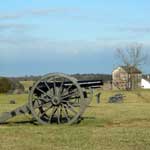 | ||
| Manassas Battlefield (NPS) |
Congratulatory proclamation of Generals Johnston and Beauregard.
HEADQUARTERS ARMY OF THE POTOMAC,
Manassas, Va. July 25, 1861.
Soldiers of the Confederate States:
One week ago a countless host of men, organized into an army, with all the appointments which modern art and practical skill could devise, invaded the soil of Virginia. Their people sounded their approach with triumphant displays of anticipated victory. Their generals came in almost royal state; their great ministers, senators, and women cam to witness the immolation of our army and the subjugation of our people, and to celebrate the result with wild revelry.
It is with the profoundest emotions of gratitude to an overruling God, whose hand is manifest in protecting our homes and our liberties, that we, your generals commanding, are enabled, in the name of our whole country, to thank you for that patriotic courage, that heroic gallantry, that devoted daring, exhibited by you in the actions of the 18th and the 21st, by which the hosts of the enemy were scattered and a signal and glorious victory obtained.
The two affairs of the 18th and 21st were but the sustained and continued effort of your patriotism against the constantly-recurring columns of an enemy fully treble your numbers, and their efforts were crowned on the evening of the 21st with a victory so complete, that the invaders are driven disgracefully from the field and made to fly in disorderly rout back to their intrenchments, a distance of over thirty miles.
They left upon the field nearly every piece of their artillery, a large portion of their arms, equipments, baggage, stores, &c., and almost every one of their wounded and dead, amounting, together with the prisoners to may thousands. And thus the Northern hosts were driven from Virginia.
Soldiers, we congratulate you on an event which insures the liberty of our country. We congratulate every man of you whose glorious privilege it was to participate in this triumph of courage and truth—to fight in the battle of Manassas. You have created an epoch in the history of liberty, and unborn nations will call you blessed. Continue this noble devotion, looking always to the protection of a just God, and before the time grows much older we will be hailed as the deliverance of a nation of ten millions of people.
Comrades, our brothers who have fallen have earned undying renown upon earth, and their blood, shed in our holy cause, is a precious and acceptable sacrifice to the Father of Truth and of Right. Their graves are beside the tomb of Washington; their spirits have joined with his in eternal communion. We will hold fast to the soil in which the dust of Washington is thus mingled with the dust of our brothers. We will transmit this land free to our children, or we will fall into the fresh graves of our brothers in arms. We drop one tear on their laurels and move forward to avenge them.
Soldiers, we congratulate you on a glorious, triumphant, and complete victory, and we thank you for doing your whole duty in the service of your country.
J. E. JOHNSTON,
General, C. S. Army.
G. T. BEAUREGARD,
General, C. S. Army
Official Records, Series I. Vol. 2, Page 574
This proclamation is notable not only for what it says to the troops who fought for the Confederacy, but for the view of the consequences of the battle and the future of the conflict. Johnston and Beauregard, and many in the North and South, saw Manassas as a defining moment. A long war was not anticipated, and Confederates could not look at the fleeing army opposed to them at Manassas and see a viable threat to their ambitions. There is also a certain degree of contempt toward the better appointed army they faced, and the civilian onlookers who had turned out to see what they assumed would be an easy victory over Confederate forces. And the language of the proclamation is indicative of how the South saw a connection between their effort and those of Washington in the Revolutionary War. It is a proclamation which, if read in 1865, would have seemed bitterly ironic.
No comments:
Post a Comment